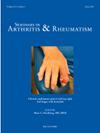如何分析和理解人体免疫系统。
IF 4.6
2区 医学
Q1 RHEUMATOLOGY
引用次数: 0
摘要
为了加深我们对包括风湿病在内的各种疾病发病机理的了解,并提高疾病控制水平,在研究小鼠免疫学的同时,深入了解人类免疫系统也是至关重要的。从历史上看,由于方法上的限制,人类免疫系统的研究一直面临着巨大的挑战。然而,最近在多因素疾病基因组研究方面取得的进展阐明,许多与风险相关的基因变异影响着细胞特异性基因表达的数量差异。鉴于这些发现,我们目前正在研究健康人和病人的个体基因变异,并将细胞分为不同的子集,以构建一个有关人类免疫系统的综合数据集。为此,我们将基因表达、影响表达机制的因素、蛋白质表达、代谢组学以及与免疫功能相关的环境变量(如肠道微生物群)等数据结合起来。这些数据集将有助于全面描述人类免疫系统的特征。利用这些数据集,并通过对每种疾病和每个人的风险基因变异和基因表达谱相关数据的综合分析,我们预计将发现有关人类免疫系统、疾病的异质性、免疫功能机制及其调控策略的新见解,而这些见解可能无法通过鼠类模型来实现。本文章由计算机程序翻译,如有差异,请以英文原文为准。
How to analyze and understand the human immune system
To enhance our understanding of the pathogenesis of diseases, including rheumatic diseases, and to improve disease control, it is essential to attain a thorough understanding of the human immune system, alongside mouse immunology. Historically, the investigation of the human immune system has posed significant challenges due to methodological limitations. Nonetheless, recent advancements in genomic studies of multifactorial diseases have elucidated that numerous risk-associated genetic variants affecting quantitative differences in cell-specific gene expression. In light of these findings, we are currently examining individual genetic variations in both healthy individuals and patients, as well as categorizing cells into distinct subsets in order to construct a comprehensive dataset concerning the human immune system. This is accomplished by combining data on gene expression, factors influencing the expression mechanisms, protein expression, metabolomics, and environmental variables pertinent to immune functionality—such as gut microbiota. These datasets will facilitate the comprehensive characterization of the human immune system. Using these datasets and through the integrative analyses of data related to risk genetic variations and gene expression profiles of each disease and individual, we anticipate uncovering novel insights into the human immune system, the heterogeneity of diseases, immune function mechanisms, and their regulatory strategies that may not be achievable through murine models.
求助全文
通过发布文献求助,成功后即可免费获取论文全文。
去求助
来源期刊
CiteScore
9.20
自引率
4.00%
发文量
176
审稿时长
46 days
期刊介绍:
Seminars in Arthritis and Rheumatism provides access to the highest-quality clinical, therapeutic and translational research about arthritis, rheumatology and musculoskeletal disorders that affect the joints and connective tissue. Each bimonthly issue includes articles giving you the latest diagnostic criteria, consensus statements, systematic reviews and meta-analyses as well as clinical and translational research studies. Read this journal for the latest groundbreaking research and to gain insights from scientists and clinicians on the management and treatment of musculoskeletal and autoimmune rheumatologic diseases. The journal is of interest to rheumatologists, orthopedic surgeons, internal medicine physicians, immunologists and specialists in bone and mineral metabolism.

 求助内容:
求助内容: 应助结果提醒方式:
应助结果提醒方式:


